Word Forms
Word forms refer to the different variations a word can take based on its grammatical function in a sentence.
Key Categories
- Verbs
- Nouns
- Adjectives
- Adverbs
Importance of Word Forms
- Enhances communication skills
- Enables effective writing and expression
Infinitive Form
- Definition: The base form of a verb with the word "to."
- Example: "to run," "to eat," "to write."
Past Tense
- Definition: Describes an action that occurred in the past.
- Example: "ran," "ate," "wrote."
Present Participle (Gerund)
- Definition: The -ing form of a verb used in progressive tenses or as a noun.
- Example: "running," "eating," "writing."
Future Tense
- Definition: Describes an action that will occur in the future.
- Example: "will run," "will eat," "will write."
Noun Forms
Nouns: Names for people, places, things, or ideas. For example:
- Cat (singular) / Cats (plural)
- Friend / Friends
- City / Cities
Noun Forms Derived from Verbs:
- Running (gerund, a noun formed from a verb)
- Happiness (a noun formed from the adjective happy)
Verb Forms
Verbs: Express actions, occurrences, or states of being. Example:
Verb Forms for Different Tenses:
- Run (present), ran (past), will run (future)
- Write (present), wrote (past), will write (future)
Adjective Forms
Adjectives: Describe or modify nouns. For instance:
Adjective Forms Derived from Nouns:
- Friendship (noun to adjective), friendly (adjective)
Adverb Forms
Adverbs: Modify verbs, adjectives, or other adverbs. Example:
Adjective Comparison Forms
Comparative and Superlative Forms:
- Big (positive), bigger (comparative), biggest (superlative)
- Happy (positive), happier (comparative), happiest (superlative)
Tips for Mastering Word Forms
Practice, Practice, Practice:
- Write sentences using different forms of the same word.
- Create flashcards with a word on one side and its various forms on the other.
Read Widely:
- Reading exposes you to diverse word forms used in various contexts.
Use Resources:
- Online dictionaries often provide information about different word forms.
Play Word Games:
- Games like Scrabble or word puzzles can help reinforce word forms.
Importance of Understanding Word Forms
- Communication: Enables clearer and more expressive communication.
- Writing Skills: Enhances writing by allowing for varied and precise language use.
- Reading Comprehension: Helps in understanding texts with diverse vocabulary.
Example Sentences Demonstrating Word Forms
- The cat chased the mouse.
- Running is a great way to stay fit.
- She writes stories that make everyone happy.
- The friendly dog wagged its tail happily.
- He ran faster than anyone else in the race.
Conclusion
Remember, understanding word forms is like having a toolkit for language. It gives you the ability to express yourself in versatile and impactful ways!

